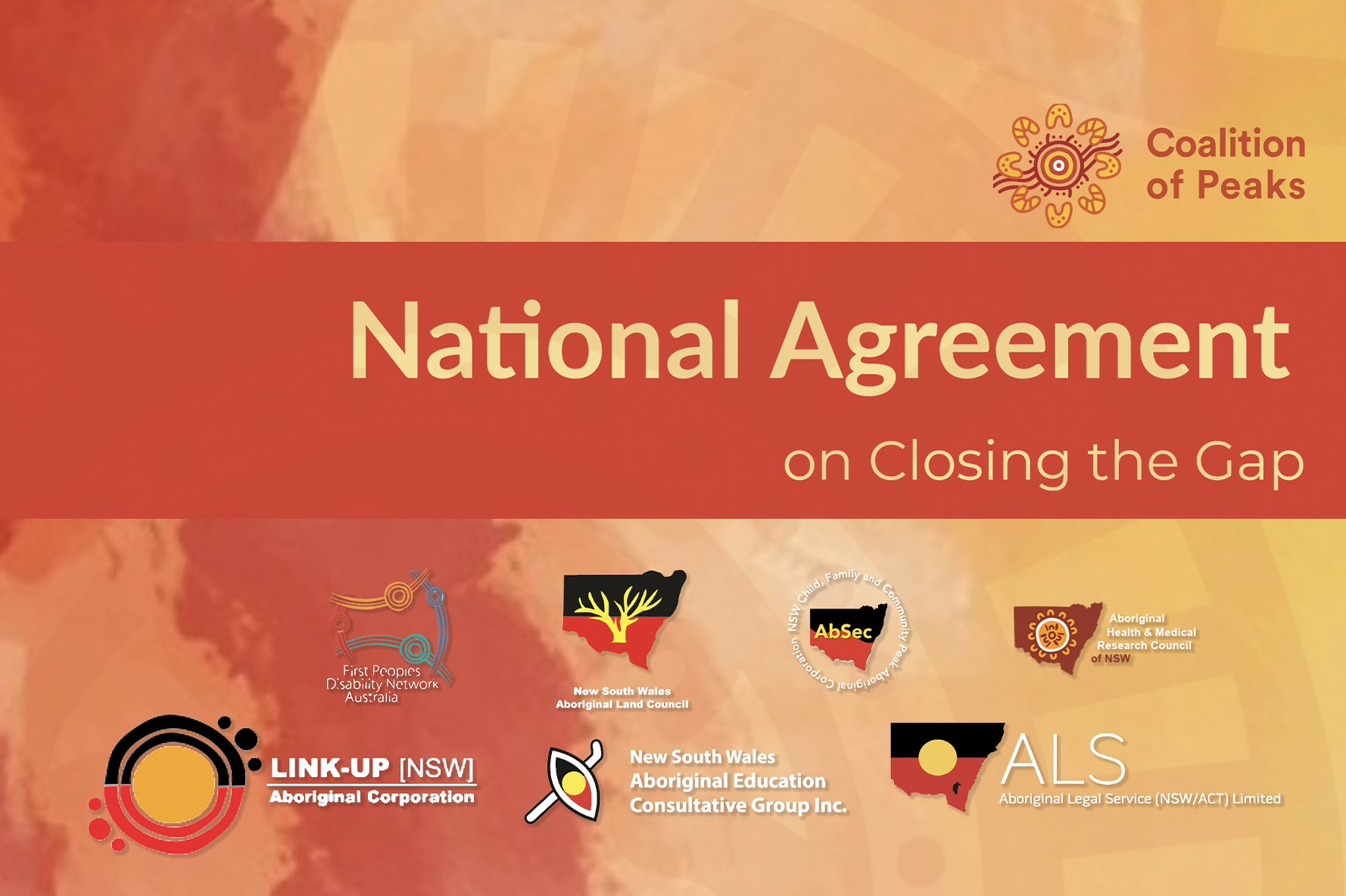
30 July, 2020
NSW Coalition of Aboriginal Peak Organisations (NSW CAPO) has supported the National Agreement on Closing the Gap signed by the National Cabinet, the Australian Local Government Association and the Coalition of Aboriginal and Torres Strait Islander peak organisations today.
The National Agreement signals a turning point in the relationship between Aboriginal and Torres Strait Islander people and governments – one that is based on shared decision making on policies and programs that impact Aboriginal and Torres Strait Islander people’s lives.
NSW CAPO came together with more than fifty other Aboriginal and Torres Strait Islander community controlled peak bodies to advocate for Aboriginal communities to bring change with how governments were going about Closing the Gap.
The negotiations on the National Agreement with governments were hard fought. For NSW CAPO and the Coalition of Peaks, the National Agreement is not just words. They represent actions that can make a difference to the lives of our people, our families and communities.
Guiding NSW CAPO in our negotiations were our extensive community based networks and the voices from the community members who participated in our public NSW engagements in late 2019. The engagements were one of many opportunities for communities to have their say. The report ‘a new way of working’ has been our driving force in advocating for our communities on what should be included in the Agreement. NSW CAPO Co-Chair, Cr Charles Lynch from the New South Wales Aboriginal Land Council said the voices from local communities formed a solid position for NSW CAPO.
“No one knows more what is needed more to Close the Gap for our communities, than our people, Cr Lynch said.
“For the first time, Aboriginal people have had a direct say in what’s important to them.”
The new National Agreement is a commitment from all governments to fundamentally change the way they work with Aboriginal and Torres Strait Islander communities and organisations through four Priority Reforms that were overwhelmingly supported at the NSW and national engagements.
“NSW CAPO is pleased the National Agreement includes these Priority Reforms. Their inclusion is a driving factor of change for our people,” said Cindy Berwick, NSW CAPO Co-Chair and NSW AECG President.
The Priority Reforms commit governments to:
- New partnerships with Aboriginal and Torres Strait Islander communities across the country;
- Strengthen community-controlled organisations to deliver closing the gap services;
- Address structural racism within government agencies and organisations; and
- improve sharing of data and information with Aboriginal and Torres Strait Islander organisations to support shared decision making.
There is a big difference from what governments alone were prepared to commit to in December 2018 and where we are now. That change has come about because of the work of the Coalition of Peaks and the support of our communities and organisations.
The National Agreement does not include everything the Coalition of Peaks wanted but Governments were pushed in their commitments because the Coalition of Peaks have been at the negotiating table. In particular, NSW CAPO are disappointed with the outcome of the Justice targets. We would like to lift the targets to ensure there is proportionate effort and resources to address the incarceration of Aboriginal people. We’re continuing to strongly advocate for governments to do much better.
We are strong, smart and resilient people, we must see in Closing the Gap that we have life outcomes that reflect our inherent strengths; said Cindy Berwick, NSW CAPO Co-Chair and NSW AECG President.
The National Agreement and the work of the Coalition of Peaks complements the efforts led by First Nations people across the country to improve the life outcomes of our people, including the implementation of the Uluru Statement of the Heart through a constitutionally enshrined Voice to Parliament.
Closing the Gap is one part of a much bigger picture for our people and it’s only the start of the journey. NSW CAPO are of a strong view that all efforts that help to advance our position in the country are important and should be pursued equally.
To read the full new National Agreement on Closing the Gap, head to the Coalition of Peaks website: https://coalitionofpeaks.org.au/new-national-agreement-on-closing-the-gap/
Click here to read the Highlights of The New National Agreement
For more information and media enquiries:
- NSW CAPO media contact: Paul Cochrane on 0437 543 626
- Coalition of Peaks: Jo Scard on 0457 725 953 or jo@fiftyacres.com; and Julia Macerola on 0422 337 332 or julia@fiftyacres.com

